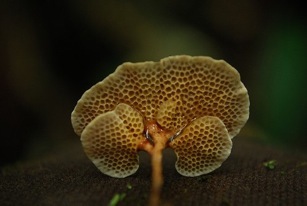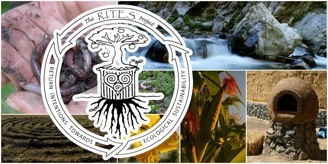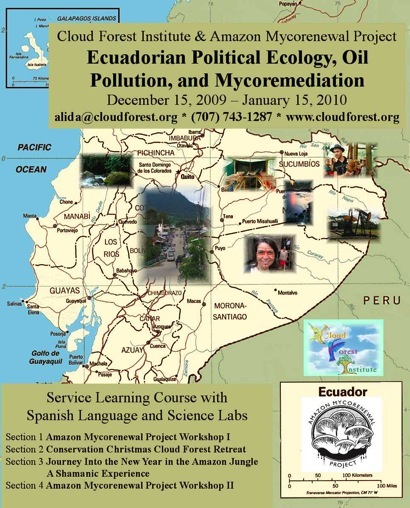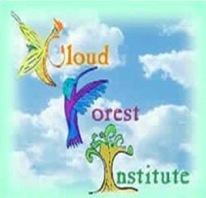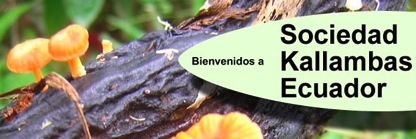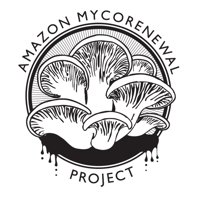Courses, Workshops & Events









Home | About Us | Contact Us | Store

2008, Living Mandala
creative services by: 360 Degrees
Including
MYCOLOGY & MYCOREMEDIATION
LATIN AMERICAN POLITICAL ECOLOGY
ECUADORIAN CULTURAL TRADITIONS
OIL ECONOMICS
TOXICITY & BIOREMEDIATION
AMAZON WILDERNESS EXPLORATION
HIKING & RIVER RAFTING
CLOUD FOREST BIOLOGY
RAINFOREST THREATS & CONSERVATION
AMAZON SHAMANISM
HANDS-ON MYCORENEWAL PROJECTS
In Association With
Amazon Mycorenewal Project
Cloud Forest Institute
The Rites Project
Amazon Defense Coalition
Ecuadorian Mycological Society - Kallambas
Clean Up Oil Waste Project LLC
Eyes of Gaia
Facilitators & Instructors
Freeda Alida Burnstad
Donald Moncayo
Lindsay Ofrias
Nicola Peel
Robert Rawson
Silvia Sornoza
Cristian Vaca
Ricardo Viteri
Course Inspiration
Millions of gallons of petroleum spilled since the 1970's currently pollute the Ecuadorian Amazon, renowned for its high degree of biodiversity and species endemism. As a result, agricultural lands are unusable, animals are poisoned and people suffer from related illness and face some of the highest cancer rates in the world. Mycoremediation is a developing scientific field experimenting with mushrooms to sequester toxins. Mycelium is now being tested in Ecuador in an effort to clean up billions of gallons of toxic oil wastes left behind by Chevron Texaco during its 20 years of operation there (for which the company is currently on trial in perhaps the largest environmental lawsuit in history). Mycoremediation is bringing new hope to this dire situation. Oyster mushrooms can metabolize petroleum toxins, effectively remediating damaged lands. For the second year, Cloud Forest Institute and the Amazon Mycorenewal Project welcome students from a variety of academic backgrounds including biology, ecology, mycology, the social sciences, non-profit management and education to participate.
Course Description
The Cloud Forest Institute and the Amazon Mycorenewal Project invite undergraduate, graduate and lifelong students to attend our 2009 Winter Service Learning Course Ecuadorian Political Ecology, Oil Pollution, and Mycoremediation. This course will take students to Quito, Lago Agrio, Mindo and Cuyabeno to experience the striking biological and cultural diversity of Ecuador's many regions including the Andes Mountains and Amazon Rainforest. Students will participate in the development of ground breaking mycoremediation technology and study Latin American political ecology. Service learning students will help heal lands and communities polluted by the oil industry. Students can receive independent study credit through their current college or university. Students may enroll in four, week-long sections individually or for the entire month long course in which we will examine Ecuadorian cultural traditions, political ecology, oil economics, toxicity and
bioremediation. Cloud Forest Institute will help students pre-arrange with their University department to earn up to 4 credits through independent study.
The Ecuadorian Amazon Rainforest

That Rainforests are vital for global climate control is common knowledge based on scientific fact. Metaphorically speaking they are the lungs of the world, producing 40% of the oxygen we breathe. At the same time Rainforests are indispensable regulators of CO2 in the atmosphere. The Amazon Rainforest represents over half of the Rainforests remaining on this Earth today. Ecuador's Amazon region, comprising 13 million hectares, is home to 30% of all biodiversity. Approximately 40,000 plant, 3,000 fish, 1,560 bird, 430 mammal, 420 amphibian, 380 reptile and an almost infinite number of insect species have been classified. Nurtured by the Andes mountain range, the Ecuadorian Amazon Rainforest forms a particularly significant part of the headwaters of the Amazon River basin, which is the source of fresh water supply to millions of people. UNESCO, the World Wild Life fund and the World Bank suggest that the Amazon Reserve for Peace located at the head waters of the Amazon River basin, is an integral part of the most species rich tract of Tropical Rainforests in the world. The area is scientifically catalogued as a Ôø‡Globally Outstanding Eco-regionÔø‡, whereby it acquires a Ôø‡Highest Priority statusÔø‡ for all forms of cooperation concerned with the protection of Tropical Rainforests, flora, fauna, fresh water supplies and the ancestral rights of the Amazon indigenous inhabitants.
Amazon Rainforest Indigenous Cultures

Ten identified Indigenous civilizations, approximately 115,000 people, inhabit the Ecuadorian Amazon- Achuar, AiÔø‡Cofan, Huaorani, Quichua, Secoya, Shiwar, Shuar, Siona, Taromenani and Zaparo. Their culture, economy and welfare are synonymous with the protection and integrity of their ancestral lands. The Rainforest is the genesis of traditions, spiritual life and ancestral medicine, and constitutes the essence of cultural values. The Amazon Shamans believe that the source of life lies in the equilibrium and reciprocity between humans, flora and fauna. The Ancestral medicine practiced by the Shamans is based on over 700 species of plants, endemic to the Amazon Rainforest. These medicinal plants account for 25% of all western pharmaceuticals, although they only represent 10% of the plant species utilized in Shamanic remedies. The indigenous people there contend that an ecologically balanced and uncontaminated environment conditions the survival of Amazon Indigenous cultures.
How does mycorenewal work?
People often ask if mushrooms can "absorb" or "eat" oil. In fact, the root-like component of mushrooms (called mycelium) actually breaks down petroleum by excreting extracellular enzymes outside of its body. This is how fungus metabolizes petroleum. Mycologists acclimate the mycelium we use in a laboratory so that it is accustomed to recognize petroleum as a nutrient. Mycorenewal is a fairly new technique that has been proven successful in the lab, but limited studies have been done on its real-world applications.
Why do mycorenewal in the Amazon?
Many people are unaware that the largest land-based oil spill in the world is located in the Sucumbios province of the Ecuadorian Amazon region. Since the 1960s, Texaco and other oil companies have intentionally dumped petroleum waste products, failed to uphold safety regulations, and ignored degraded pipelines that spring leaks on a weekly basis. As a result, it is estimated that 18.5 billion gallons of oil now contaminates this biodiverse and ecologically unique area.
How does the oil spill affect people and the ecosystem?
Local people are afflicted by among the highest cancer rates in the world, birth defects, and severe skin problems. There is no safe water, since groundwater and even rainwater are contaminated by constant leaching. Livestock graze on polluted lands and people bathe and wash clothes in contaminated river water.
How are local people dealing with the oil pollution?
Local communities are very well organized and are working for legal justice, addressing the resulting public health crisis, and fighting to prevent further spills. The Amazon Defense Coalition is leading a multi-billion dollar lawsuit against Chevron-Texaco for remediation funding to clean up their community. The Amazon Mycorenewal Project is directed and coordinated by local leaders.
Why do you think mycorenewal is an important technique for this situation?
For certain types of contaminated sites, mycorenewal can be faster, more effective and much more cost effective than other remediation methods, such as those using bacteria and chemical bleaches. The Amazon Mycorenewal Project works with mushroom species native to the region.
How Can I Get More Involved.?
Contact us to plan a visit with us to the Ecuadorian Amazon, host an event in your community, make a donation, or study with us for independent study credit from most universities.
Ecuadorian Political Ecology, Oil Pollution, and Mycoremediation
Winter Service Learning Course
December 15 - Januay 15, 2010
Equador - Quito, Lago Agrio, Mindo and Cuyabeno
Course Details & Itinerary
A Country Study: Intro to Ecuadorian Culture, History and Ecology - Monday, December 14:
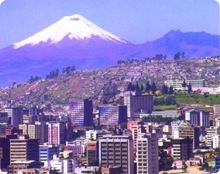
Section 1 - Wednesday 16th - Monday 22nd Field Study: Mycorenewal of Toxic Sites

Section 2 - Tuesday 23rd - Sunday 28th Cloud Forest Conservation Christmas Retreat
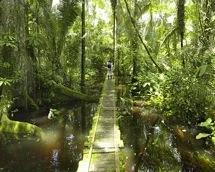
Section 3 - Monday 29th - Monday 5th Journey Into the New Year: A Shamanic Experience in Pristine Amazon

Section 4 - Tuesday 6th - Thursday 14th Peak Oil Issues: Production, Destruction of Ecology and Effected Communities
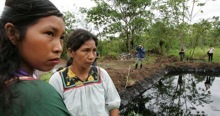
Thursday, December 14th: Farewell dinner.
Trip Extensions
Spanish instruction may be arranged for before the course begins, and is available during the entire course for additional cost. Other language instruction, travel and volunteer arrangements can be made to extend your trip. We recommend not leaving Ecuador without a visit to the Galapagos Islands and suggest visiting the Temple of the Moon Inca ruins in Inga Pirca. For those with more time Cloud Forest Institute can arrange volunteer experiences with a variety of organizations including the Amazon Mycorenewal Project. Please inquire with CFI for more information.
Tuition & Regiatration
Tuition is $1,000 per section or $3,600 when enrolled in all four sections. Tuition covers food, lodging and in country transportation, special gear, as well as activities listed in the itinerary. Spanish instruction is optional and entails further costs depending on needs.
Additional costs not covered may include, but are not limited to: airfare, required travel insurance, optional travel immunizations, suggested reading, beverages, souvenirs, tips and donations. $100 articulation and curriculum fee for students seeking college credit through independent study. To register click here.
Scholarships
Scholarships are available. We currently have a few scholarships left at $700 per session, $2,800.
To apply, write a small essay (about 250 words in length) with a brief autobiographical statement describing your background, interests and what you hope to gain by attending this course, and why you deserve a reduction in fees. Include a CV or resume if possible. Email applications to miarosequartz(at)gmail.com
Prerequisites and Other Academic Information
Intermediate level Spanish is recommended to get the most out of this course, but is not required. Students enrolling in independent study to receive credit must make arrangements before the course begins and will have more rigorous academic responsibility than those attending for life learning interest. Undergraduate students in their first or second year should have already completed their general education writing requirement. Students in their third or fourth years should have finished the introductory seminars for their particular major. High school students may enroll when accompanied by a parent, guardian, or legally designated chaperon. The college or university through which independent study is granted will charge tuition beyond the costs of the course. Financial aid may be available to help with tuition and course fees.
Course Contact Info
For questions or additional information contact Freeda Alida Burnstad at:
email: alida(at)cloudforest.org
phone: (707) 743-1287
web: www.cloudforest.org
snail mail: P.O. Box 1435, Ukiah, CA 95482
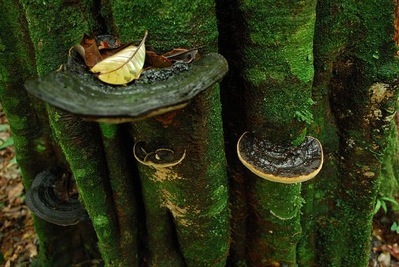
Donate to the Amazon Mycorenewal Project
The Amazon Mycorenewal Project is in need of funding to continue experiments and education. We can not heal the Amazon without your financial support and volunteer efforts.
Make your secure online donation through Network for Good:
Tax-deductible donations can be made by check to Cloud Forest Institute, a 501 (c) 3 non-profit organization:
Amazon Mycorenewal Project
c/o Cloud Forest Institute
PO Box 1435
Ukiah, CA 95482
Or call (707) 463-2482 for more options on how to support the Amazon Mycorenewal Project. Thank you for your support!


Facilitators & Instructors
Mia Rose Maltz
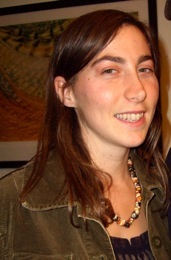
Mia Rose Maltz is a co-founder and Executive Director of theRITESProject and has lived in west Sonoma County for nine years. Mia has been learning aboutmycology, mushroom cultivation and mycorestoration for twelve years and has taken several classes with Paul Stamets, founder of Fungi Perfecti. She was certified in Permaculture Design in 1999 at OAEC. In 2003, she was certified to teach Permaculture at the Diamond Light Center in Oakland. Mia is a Fellow of the Leadership Institute for Ecology and the Economy and she enjoys teaching about Permaculture, mycorestoration, and bioremediation. She attended Colgate University, completed her B.A. in Culture, Ecology, and Sustainability from New College of California in 2000. Mia is currently pursuingher Masters of Science degree in Biology, Chemistry and Environmental Studies at Sonoma State University.
Nicola Peel
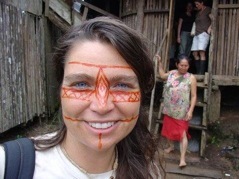
Freeda Alida Burnstad
Director of Cloud Forest Institute - Guest speaker during Cloud Forest portion. Amazon Mycorenewal team member.
Freeda is co-founder and director of the Cloud Forest Institute, which supports the Amazon Mycorenewal Project in fundraising, outreach, promotional materials and volunteer recruitment. She has over ten years of experience in environmental education and conservation in Ecuador.
Donald Moncayo
President (Mayor) of the community Santa Cruz - Local host and experiment lead. AMP team member.
Lindsay Ofrias
Founder of The Clean Up Oil Waste Project LLC - Course independent study supervisor. AMP team member.
Robert Rawson MS
International Wastewater Solutions - Bioremediation and Waste Water Specialist. Course workshop presenter. Part-time faculty for Santa Rosa JC. AMP team member.
Silvia Sornoza
Executive Assistant, Cloud Forest Institute - Provides in country logistical support. AMP team member.
Cristian Vaca
Environmental Activist - Cloud Forest Institute coordinator in Mindo. Guest speaker.
Ricardo Viteri
Ecuadorian Mycological Society Kallambas - Commercial mushroom grower in Quito. AMP team member.
Additional Instructors & Support Staff
Language instruction is provided by the licensed instructors of Amazonas Spanish School. Other guest lecturers and local experts not listed here will be featured in the course.
Affiliated Organizations


